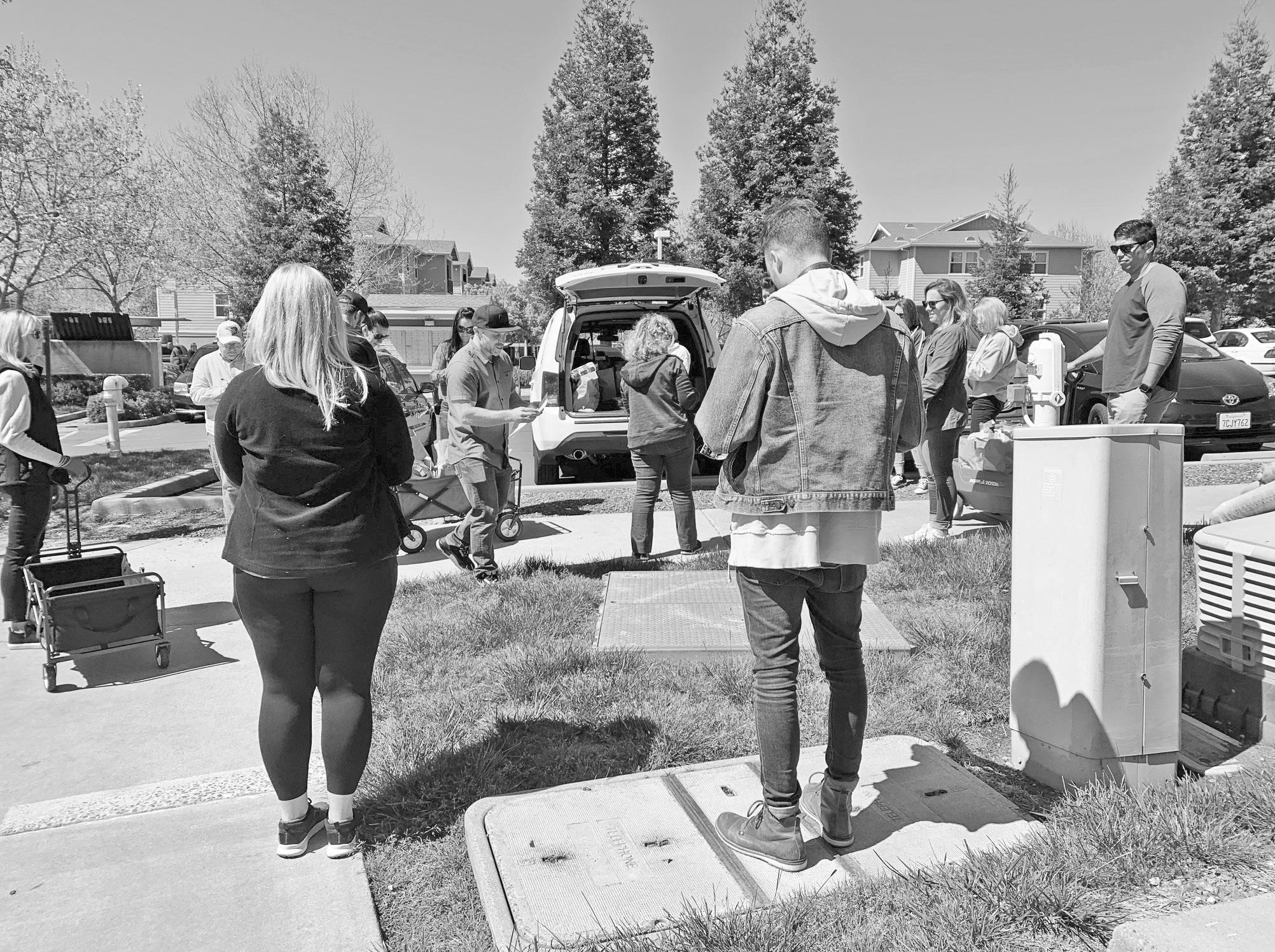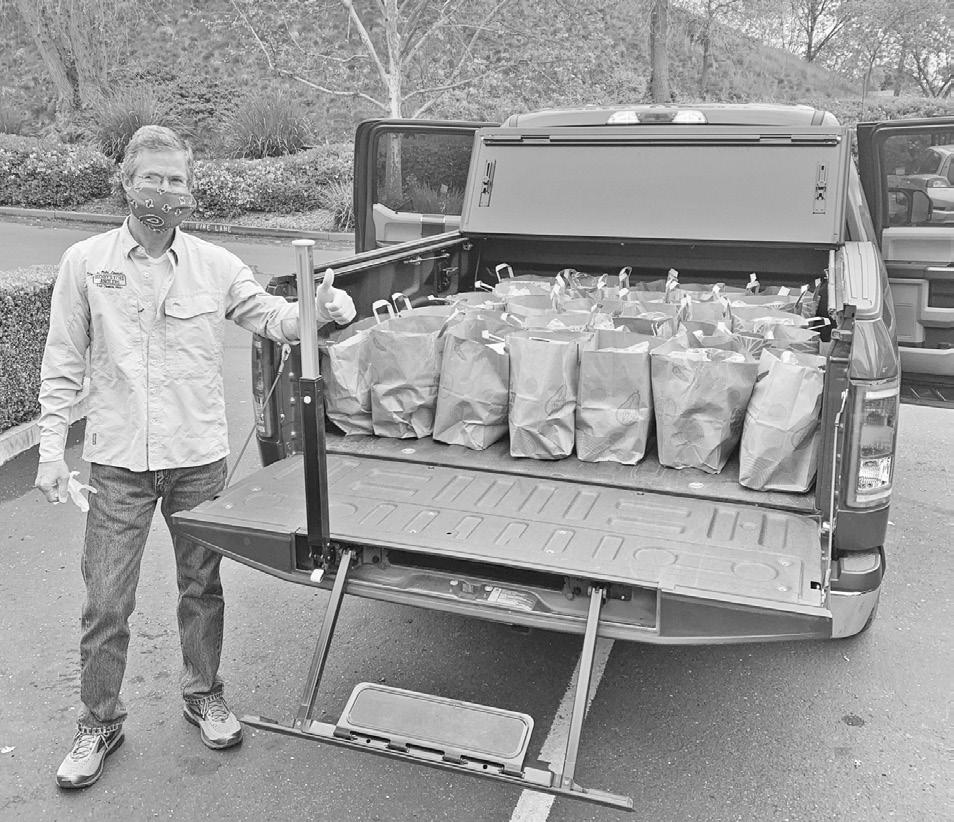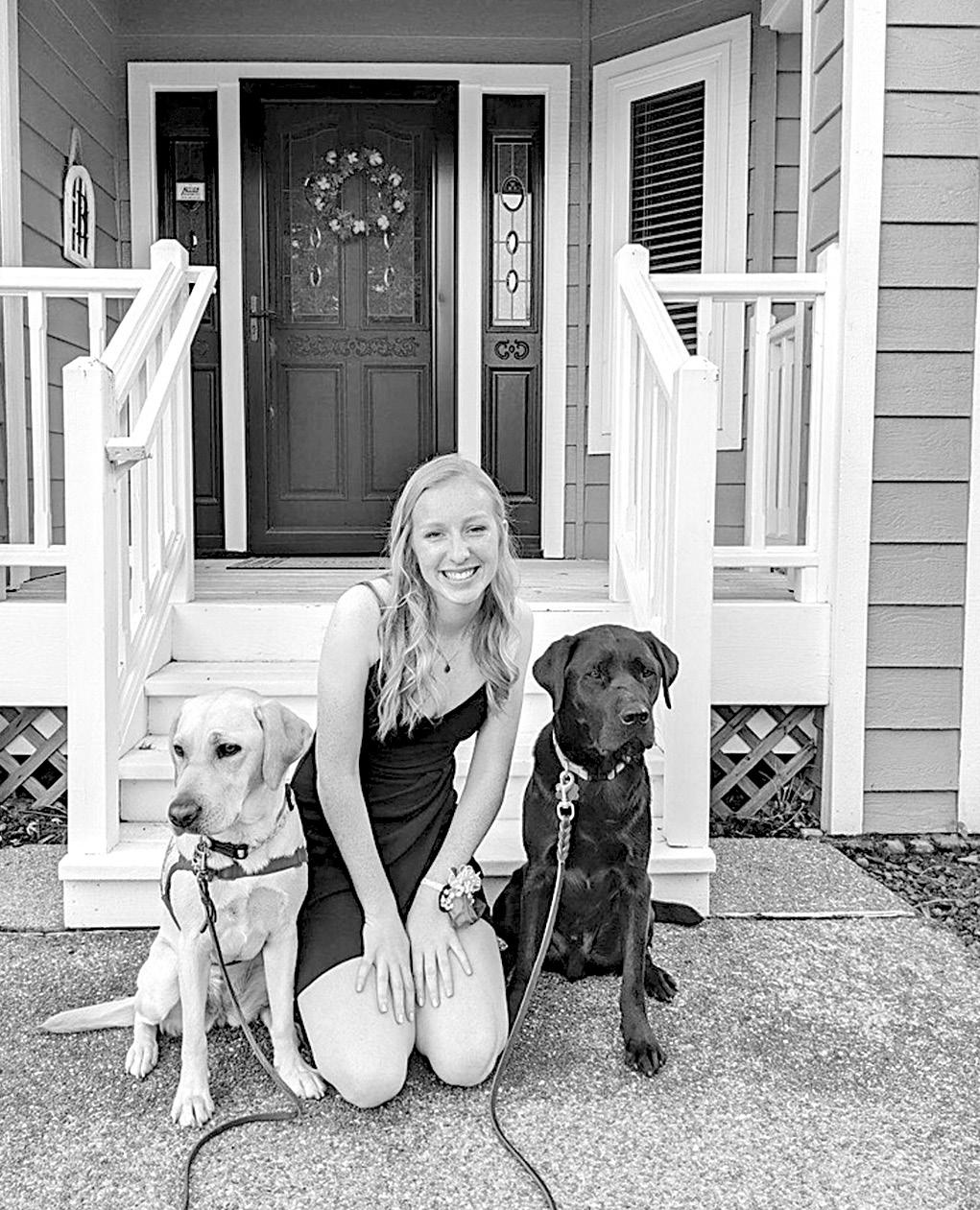
6 minute read
Then it begins to multiply. One virus germ becomes two. Two become four. Four become eight
Rolling Hills Church volunteers deliver
Community members (safely) reach out to vulnerable residents during COVID-19 pandemic
Eddie Zacapa Special to the Democrat A s Pastor Matt Kuwalski and a group of volunteers from Rolling Hills Church recently drove up to White Rock Village apartments in El Dorado Hills to deliver 60 bags of groceries to seniors, it started raining.
“We were considering unloading the bags in the leasing office and leaving them there for another time,” said Eddie Zacapa, a Mercy Housing resident services coordinator at the property. “I suggested we wait 15 minutes and I went inside the leasing office and started praying for the rain to stop while the group prayed and waited in their vehicles.”
Fifteen minutes later the rain had ceased and the group of volunteers was delivering groceries to seniors, families in need and those most vulnerable to getting COVID-19.
“During this time many seniors may not want to go to the store or may not have someone who can go for them,” Zacapa said. “This is a blessing that Rolling Hills Church can provide this service.”
Rolling Hills Church plans to deliver food to seniors and individuals in need every Thursday at White Rock Village during this time that seniors are encouraged to stay home and shelter in place.
Pastor Kuwalski said what motivated them was the opportunity to meet the need in the community. “We just saw a need and during this time when there is so much uncertainty, anxiety and fear, we wanted to bring some hope, light and smiles to people’s faces,” he explained.
White Rock Village, a property of Mercy Housing in El Dorado Hills, provides affordable housing to create stable and healthy communities by developing, financing and operating affordable, program-enriched housing for families, seniors and people with special needs who lack the economic resources to access quality, safe housing opportunities.
Rolling Hills Church also donated groceries to “It touched me that our community is reaching out and not forgetting about individuals that may not be able to get out during this extraordinary time.” — Iva Bartley
Courtesy photos Rolling Hills Church volunteers get ready for another grocery delivery. The group is bringing groceries to those who cannot risk going to the store themselves because of the COVID-19 threat. Below, Rolling Hills Church volunteer Joe Davis poses with the full grocery bags waiting to be delivered.
seniors at Creekside Manor in Folsom, another Mercy Housing senior property, and is giving out grab-and-go lunches to kids at Folsom Gardens.
“We just wanted people to know that they had been seen — that they are loved,” Pastor Kuwalski said.
Iva Bartley, a resident who received groceries, said, “It touched me that our community is reaching out and not forgetting about individuals that may not be able to get out during this extraordinary time. It gave me hope.”
District Church, Hands4Hope, El Dorado County Food Bank, Twin Lakes Food Bank and Buckeye Union School District are also reaching out and donating food to White Rock Village. If you are interested in donating food call (916) 941- 2357.

Girl Scout and her canine companion going for gold
Jana Rossi Staff writer O ak Ridge High School Nicole Shedd began working on her Girl Scout Gold Award during her sophomore year, deciding to take on a service project that checked two important boxes — fulfilling a passion and honoring someone she holds close to her heart.
“Animals, especially dogs, have always been a passion of mine,” explained Nicole, who plans to study animal science in college and chose this project in memory of her late math teacher, Mrs. Mattey.
Shedd decided she would volunteer to be a puppy raiser for Canine Companions for Independence, which trains assistance dogs for children, adults and veterans with disabilities. Puppy raisers volunteer their time and households to the training and raising of Labrador or golden retriever puppies from the time the pups are eight weeks old. Puppy recruits spend about a year and a half with their puppy raisers, learning basic etiquette such as potty training, crate training and socialization skills before returning to Canine Companions for continued professional training.
During those following six to nine months they learn more advanced commands such as turning on lights, picking up dropped items and opening and closing drawers. Graduating canines are then placed in various assistance roles, depending upon their skills. Some will go on to become service dogs, where they will help adults with daily tasks, while others will work as hearing dogs and be the ears for the deaf and people with hearing loss. Skilled companion dogs help children and adults with various disabilities lead more independent lives and facility dogs visit and educate the public in schools or hospitals.
If a pup doesn’t quite make the cut, like Nicole’s first Canine
Courtesy photo Girls Scout Nicole Shedd poses with her pups — Helga, a Canine Companions for Independence trainee, left, and Kamden, the family dog.

Companion puppy named Kamden, they are released from the program.
“It takes a very special dog to be a service dog and that just was not his calling,” said Nicole, who was then given the option of adoption. Kamden now lives a wonderful life with the Shedd family as their family dog.
Nicole’s project focused on training and spreading knowledge about service dogs and making the public aware of service dog fraud.
“Service dog fraud occurs when people pose their pet dog as a service dog by putting service dog vests on dogs that have not been properly trained and do not have public access rights. This is illegal, disrespectful and dangerous to service dogs and their handlers,” she explained. “Service dogs take years of hard work, socialization and money to properly equip them to be able to help someone with a disability and the majority of service dogs cost more than $10,000 (service dogs from Canine Companions are free for graduates).
“It is dangerous and disrespectful for people to bring their pet dogs into public places because of all of the hard work it takes to train a service dog for a person with a disability ... and it could put the service dog in danger if the pet gets out of control,” Nicole added.
She noted people who have service dogs “need the dogs.”
The puppy-raising experience taught Nicole three important things: “how to take responsibility for another being, how to manage my time and how to show empathy.”
“It is a lot of work to raise a puppy to become a service dog; you are responsible for both their physical needs and managing their behavior that is appropriate for a service dog that someone will rely on in the future,” she shared. “Empathy was also a huge part of my project and has shaped me immensely as a person. I have learned how to have empathy for these dogs that work so hard as well as for the graduates who live with some type of physical or mental disability, but that doesn’t stop them from accomplishing amazing things. Many of the graduates that I have had the opportunity to meet are so beyond thankful for puppy raisers and the stories they tell about why they are excited for the dog and what they are excited to be able to do now that they have a dog is so inspiring.”
Nicole is now on her second Canine Companion, Helga, and said Kamden is a big help. “When we are practicing commands with Helga, Kamden always joins and ‘teaches’ her,” she said, adding that Kamden is a “super special pup who loves to work and we continue teaching him everything we can.”
What will happen in the event Helga doesn’t graduate? “I’m not sure yet, since I will be in college,” Nicole said, “but I have high hopes that she will graduate.”
For more information about Canine Companions for Independence visit cci.org.



